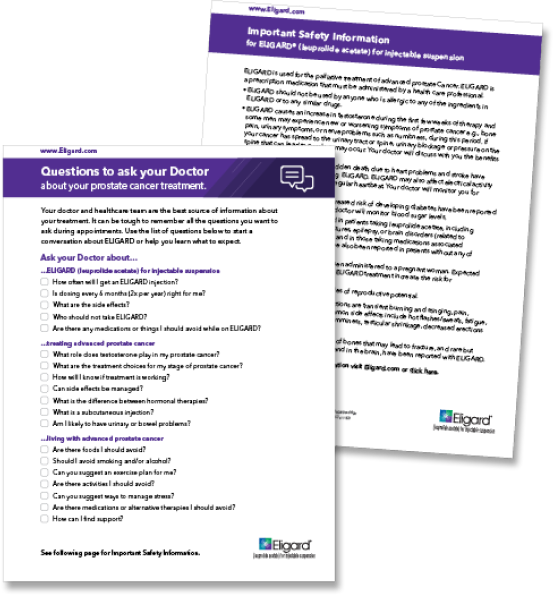ELIGARD is a safe and effective way to manage your advanced prostate cancer1
ELIGARD uses advanced extended-release delivery technology to provide consistent, continuous testosterone suppression.1,2
Inspired by a real patient.
ELIGARD uses advanced extended-release delivery technology to provide consistent, continuous testosterone suppression.1,2
Testosterone suppression is typically reached within 2 to 3 weeks
ELIGARD and its active ingredient, leuprolide acetate, have been proven in clinical studies to be safe and effective
Innovative controlled-release technology provides consistent, continuous testosterone suppression
Your doctor and healthcare team are the best source of information about your treatment. It can be tough to remember all the questions you want to ask during appointments. That’s why it’s a good idea to write down your questions in advance.



Print this guide and bring it to your next appointment to start a conversation with your doctor.
Many men experience side effects during hormonal therapies. It's important to understand these side effects and ways to help manage the ones that are most common and troublesome. See the tips below.
Hot flashes may feel like a sudden rush of warmth in the face, neck, chest, and back. They may last a few seconds to a few hours. Talk to your doctor if you have hot flashes; they may be able to help.
Fatigue can feel like extreme tiredness, exhaustion, or even having a hard time concentrating. There are many causes of fatigue, including inactivity, poor sleep, and side effects from drugs like ELIGARD. You can do many easy things to cope with fatigue:
You may get lightheaded when blood vessels in the brain dilate (expand). Alcohol, excitement, high temperatures, hyperventilation (breathing too fast), and certain medicines can also cause dizziness. Call your doctor if you feel any of the following, which may be a side effect or possibly something more serious:
Other links